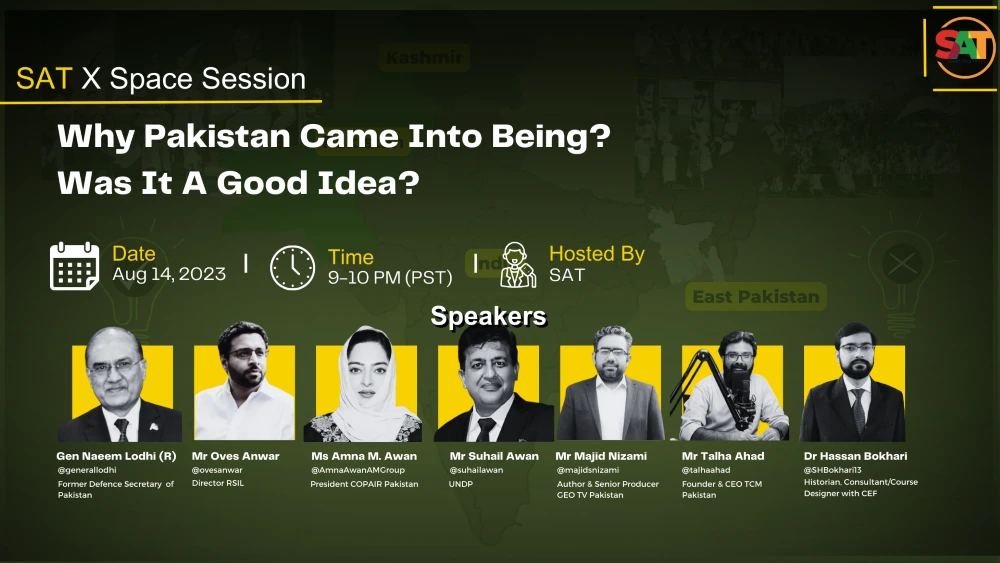On the 14th of August 2023, the South Asia Times (SAT) hosted an exclusive X Space Session. The session explored the pivotal question: “Why did Pakistan come into being? Was it a good idea?” Moderated by SAT’s Haleema Khalid, the event brought together influential speakers. They aimed to unravel Pakistan’s 76-year journey.
Ms. Amna Malik, President of COPAIR, initiated the dialogue by celebrating Pakistan’s independence and expressing optimism about the country’s future. As a Pakistani businesswoman and head of a think tank, she highlighted the empowerment of women in Pakistan. She emphasized the respect they receive. Additionally, Amna underscored the global turbulence and instability beyond Pakistan’s borders. She commended the increasing involvement of Pakistani women in unconventional businesses, signaling a promising trajectory. She called for governmental support to equip women and youth with skills, envisioning their contributions to the economy and society.
Mr. Suhail Awan, UNDP Afghanistan’s Regional Director, offered a nuanced perspective, urging acknowledgment of both the challenges and the positive aspects in Pakistan’s 76-year journey. Moreover, quoting poet Faraz Ahmed, he emphasized the importance of embracing optimism amid adversity. Suhail traced Pakistan’s political landscape, identifying patterns of instability and attributing developmental disparities to historical factors. He called for individual responsibility, advocating personal accountability for collective benefit.
Gen Naeem Lodhi, Former Defense Secretary, explored the multifaceted dimensions of stability, asserting that political stability is crucial for prosperity. He outlined religious principles for societal stability and stressed the importance of political parties adhering to democratic values. Gen Lodhi called for a balance between socialism and democracy, suggesting a maximum salary to foster social equilibrium.
Pakistan’s Identity and Youth Empowerment
Mr. Owais Anwar, Director of RSIL, applauded Pakistan’s maturing foreign policy and highlighted achievements in combatting terrorism. He emphasized the need for a proactive approach to anticipate and preempt challenges, urging the youth to be equipped with relevant skills.
Mr. Majid Nizami, Author & Senior Producer, Geo TV Pakistan, challenged the idea that Pakistan’s era of notable poets had concluded. He emphasized the symbiotic relationship between investigative journalism and societal challenges, championing its role in promoting accountability.
Mr Talha Ahad, Founder and CEO of TCM, recounted his journey in establishing initiatives and addressed the pervasive identity crisis within Pakistan. He proposed an innovative governmental model tailored to Pakistan’s unique challenges and urged proactive engagement from Pakistanis.
Dr. Syed Hassaan Bokhari, Historian and Consultant, identified an identity crisis as Pakistan’s core challenge, stemming from a lack of historical understanding. He emphasized the importance of effective governance and responded to historical factors behind Bangladesh’s separation from East Pakistan.
During the interactive discussion, a young participant questioned the blame placed on youth for pessimism, despite their active involvement in fighting injustices. In response, Dr. Bokhari drew parallels with Vietnam’s historical context. He further highlighted alternative pathways to progress through determined youth-led endeavors.
The session concluded with the presentation of the patriotic song “Sohni Dharti” by South Asia Times (SAT), followed by a thank-you note from Mr. Salman Javed, Co-founder SAT. The event ended with a poetic message from Mr Salman Javed, encapsulating the essence of the discussions.






